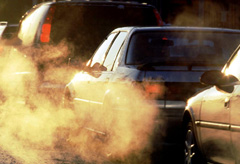Air pollution may shorten lives by up to nine years
UK air pollution causes 50,000 early deaths a year, according to the environment audit committee

UK air pollution causes 50,000 early deaths a year, according to the environment audit committee
The statistic is enough to shock anyone into reducing their carbon footprint: 50,000 people a year could be dying prematurely in the UK due to pollution.
According to a six-month investigation by the environmental audit committee, air particles from burning fuel and inhaled deeply into the lungs could cut people's lives short by up to nine years.
People living in large cities are at greater risk. In London alone, over 4,000 die a year from polluted air - more than are 2,600 deaths nationally due to road traffic accidents.
The committee, which gathered their evidence from government ministers and medical experts, are shocked by how little is being done to address pollution and the national health repercussions.
‘Despite these considerable impacts on public health, very little effort is being put into reducing air pollution levels, compared to efforts to cut smoking, alcohol misuse and obesity,' says committee chair, Tim Yeo.
‘Much more needs to be done to reduce lives and reduce the enormous burden air pollution is placing on the NHS.'
Celebrity news, beauty, fashion advice, and fascinating features, delivered straight to your inbox!
Environment groups have expressed anger over the time it has taken for the government to publish an estimate for the number of premature deaths in the UK caused by pollution.
Before this latest investigation, the highest number we had on record was 24,000 per year due to pollution.
Darren Johnson, Green Party London assembly member, agrees that a report like this is well overdue. ‘It appears that the official statements made in previous years have completely underestimated the serious nature of the impacts on human health.'
A spokesperson for the Department for Environment, Food and Rural Affairs (Defra) says: ‘We are working across government to reduce emissions further, including transport and electricity generation. But we recognise that there is more to do and will consider the EAC report carefully.'